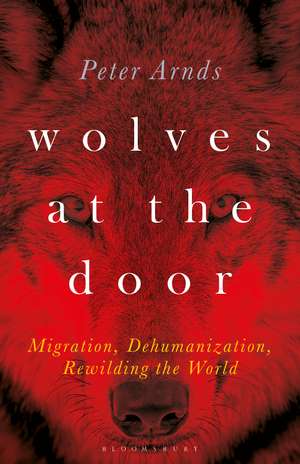Wolves at the Door: Migration, Dehumanization, Rewilding the World
Autor Dr. Peter Arndsen Limba Engleză Paperback – 27 ian 2021
| Toate formatele și edițiile | Preț | Express |
|---|---|---|
| Paperback (1) | 159.11 lei 6-8 săpt. | |
| Bloomsbury Publishing – 27 ian 2021 | 159.11 lei 6-8 săpt. | |
| Hardback (1) | 470.53 lei 3-5 săpt. | +23.58 lei 4-10 zile |
| Bloomsbury Publishing – 27 ian 2021 | 470.53 lei 3-5 săpt. | +23.58 lei 4-10 zile |
Preț: 159.11 lei
Preț vechi: 173.10 lei
-8% Nou
Puncte Express: 239
Preț estimativ în valută:
30.45€ • 31.67$ • 25.14£
30.45€ • 31.67$ • 25.14£
Carte tipărită la comandă
Livrare economică 15-29 aprilie
Preluare comenzi: 021 569.72.76
Specificații
ISBN-13: 9781501366758
ISBN-10: 1501366750
Pagini: 232
Ilustrații: 14 bw illus
Dimensiuni: 140 x 216 x 21 mm
Greutate: 0.32 kg
Editura: Bloomsbury Publishing
Colecția Bloomsbury Academic
Locul publicării:New York, United States
ISBN-10: 1501366750
Pagini: 232
Ilustrații: 14 bw illus
Dimensiuni: 140 x 216 x 21 mm
Greutate: 0.32 kg
Editura: Bloomsbury Publishing
Colecția Bloomsbury Academic
Locul publicării:New York, United States
Caracteristici
Brings in a wide-ranging and eclectic range of authors, from Shakespeare, Dickens, Kipling, Kleist, Angela Carter, Jack London, the Brothers Grimm, Cormac McCarthy, Victo Hugo, Defoe and many others, but also looks at examples from film, popular culture, fine art and news media
Notă biografică
Peter Arnds is a Fellow and the Director of the Comparative Literature programme at Trinity College Dublin, Ireland. Elected into the Academia Europaea in 2018, he has published books on Günter Grass, Dickens, Lycanthropy, Holocaust Literature and is the author of Searching for Alice (2018). His literary translation of P. Bolthauser's 'Rapids' was longlisted for the 2016 IMPAC Prize.
Cuprins
Acknowledgements1. Introduction. Wolf in the Sanctuary: Myth, Literature, Biopolitics2. Fear of the Pack: Jews and Gypsies as Wolves3. Wolves and the Indigenous: Migration of a Metaphor to the Colonies4. Wolves and Wayward Women: Between Condemnation and Empowerment5. The Wolves of War: Fascism, Terrorism, Resistance6. No Trespassing: Wolves, Borders and Immigrants7. Wolf Trails: Re-wilding the World in the Age of MigrationEpilogue. Dreaming of Wolves: The Children of Lycaon in the Age of PsychoanalysisReferencesIndex
Recenzii
Arnds' fascinating book delves into the unsettling nexus of migration, biopolitics and discursive myth-making. He explores the enduring presence of an image turned metaphor that resurfaces in multiple narratives of hatred, oppression and discrimination. His scholarly prose is both knowledgeable and deeply committed.
This fascinating, wide-ranging study explores the complex relationship between humans and wolves from ancient times to the present day, showing how the image of the untameable wolf has been appropriated for different ideological purposes. Wolves may be feared by some, occasionally even pitied, but for others they hold a darker symbolic meaning of absolute power. This book invites readers to think again about the significance of wolves in Western cultural history.
This is a book that casts new light on the discussion of the migrant and refugee crisis, and will be of widespread interest well beyond academic circles. Its interdisciplinary character at the intersection of world literature and ecocriticism, but also political and cultural theory, philosophy, and psychology will guarantee its widespread reception. It is comprehensive in its coverage of the various corners of the globe where wolves are part of the cultural consciousness.
Arnds is one of those rare scholars who can write a readerly text. In the present context of heightened nationalist tensions, he analyses how wolf myths are enacted across a wide range of contemporary political landscapes where mythical stories, folklore and imagery are used by political movements to strengthen populist, tribal and nationalist sentiments and to dehumanize and scapegoat minority groups. This is cultural studies at its best in the fluidity with which it moves across history, from high to popular culture, and from close reading to insightful political analysis. A tour de force.
This fascinating, wide-ranging study explores the complex relationship between humans and wolves from ancient times to the present day, showing how the image of the untameable wolf has been appropriated for different ideological purposes. Wolves may be feared by some, occasionally even pitied, but for others they hold a darker symbolic meaning of absolute power. This book invites readers to think again about the significance of wolves in Western cultural history.
This is a book that casts new light on the discussion of the migrant and refugee crisis, and will be of widespread interest well beyond academic circles. Its interdisciplinary character at the intersection of world literature and ecocriticism, but also political and cultural theory, philosophy, and psychology will guarantee its widespread reception. It is comprehensive in its coverage of the various corners of the globe where wolves are part of the cultural consciousness.
Arnds is one of those rare scholars who can write a readerly text. In the present context of heightened nationalist tensions, he analyses how wolf myths are enacted across a wide range of contemporary political landscapes where mythical stories, folklore and imagery are used by political movements to strengthen populist, tribal and nationalist sentiments and to dehumanize and scapegoat minority groups. This is cultural studies at its best in the fluidity with which it moves across history, from high to popular culture, and from close reading to insightful political analysis. A tour de force.
